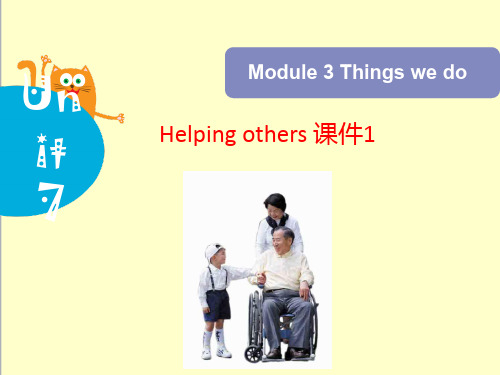2018-2019年英语沪教版小学六年级下册Module 3 Unit 7 Helping others 精选习题
- 格式:doc
- 大小:29.00 KB
- 文档页数:4










Unit 3《Our school in the future》第一课时教案教材分析本节内容选自沪版英语教材六年级(下),本单元主要内容围绕“Our school in the futrue”展开,通过本单元的学习,让学生大胆发挥想象,对我们今后的生活环境,生活方式进行猜测,提倡环保的生活意识。
首先,从视听入手,让学生整体感知课文内容。
然后指导学生阅读,通过问答的形式加强学生的口语练习。
于都后阶段是真实运用语篇的重要环节。
通过同学间的对话表演来训练他们的口语表达能力。
通过对后面的小故事使学生将所学的语言得到有效延伸。
根据课程标准对本节课的要求,针对小学生的心理特点和认知水平,结合教材,本着面向全体学生,基于学全面发展的原则,确定本节课的教学目标。
1.掌握本课时的一些日常活动用语:carry, online, head teacher, PS, mountain,even, space, dinosaur, a piece of, have a picnic, better and better等2.能读懂描述未来的短文,掌握整体理解的技能,理解文章的主旨。
教学重点:能读懂描述未来的短文,掌握整体理解的技能,理解文章的主旨。
学生分析本单元学习如何废物利用,孩子们需要提前预习,学习里面的新短语,新单词。
从学生年龄特点和认知特点,以及对英语学习的情感表现来看,本单元的教学对象是小学六年级的学生,他们学习英语的热情虽然没有低年级学生那么高、兴趣也没那么浓,但他们喜新好奇,求知欲强,富有想象力,并且具有较高的表现欲,且经过几年的英语学习,他们已有一定的词汇和语言基础。
而且他们也有比较强的竞争意识,尤其是我所教的班级,更是喜欢小组竞赛和个人竞赛以及各种表演,更喜欢通过活动游戏等形式学习新知。
教学目标Knowledge objectives知识与技能1.掌握本课时的一些日常活动用语:carry, online, head teacher, PS,mountain, even, space, dinosaur, a piece of, have a picnic, better and better 等2.能读懂描述未来的短文,掌握整体理解的技能,理解文章的主旨。






Module 3 Unit 7 Helping others 习题
一、单词拼写
1.铃铛_________
2.脖子__________
3.以前_________
4.门卫__________
4.赞扬_________ 6.因什么赞扬________
二、翻译题
1.在街上经常有人扶老人过马路。
2.在家要帮助父母干家务。
3.在空闲时间,读报给爷爷听。
4.不能歧视残疾人。
5.帮助别人可以获得快乐。
三、阅读理解
Helping others makes me proud I paid a visit to a church in Washington DC not long ago and got to go to a service (服务) for the
homeless.
When we arrived at the church, our fiends Roger and Nancy, who work in the church, gave us a
warm welcome and invited us inside. The priest (牧师) was standing in front of a screen and giving a
sermon (布道).
He told jokes and funny stories in his sermon. For the
first time I realized church could be fun.
After that, we walked down to the hall where we were to serve the homeless. Two volunteers, Jason
and Sandra, were clearing the table and making dinner.
"We have been coming here each weekend for two years. "Sandra told me." It's really nice to help
the homeless people." She told me the church has been doing these services every week for many years.
When we finished setting the table and cooking dinner, Jason brought the homeless people to the
church. We served a big meal of potatoes, chicken,green beans and cake. We sat down at the table and
chatted with some of the homeless people.
One man told me: "People ask me: 'Is it difficult to be a homeless person?' and I say:
'I don't feel it's that hard. It doesn't matter if I'm homeless or not because I have this church and I have people like you.' "Hearing these words from a homeless person, I felt prouder than I ever had before.
1. Where did the writer pay a visit?
A. A church in Washington.
B. A friends home.
C. A church in Washington DC.
D. We don't know.
2. The writer realized the church could be fun for the first time, because _______.
A. the writer's friends gave a warm welcome.
B. the priest was standing in front of the screen.
C. the writer's friends told jokes and funny stories.
D. the priest told jokes and funny stories in his sermon.
3. How many volunteers are mentioned in the passage?
A. Four.
B. Three.
C. Two.
D. One.
4. How often do they go to the church to help people?
A. once a month
B. Once a week.
C. Every two years
D. Every day
5. What did Jason do when the meal was finished?
A. He sat down at the table and enjoyed the meal.
B. He chatted with some:of the homeless people.
C. He brought the homeless people to the church.
D. He served the big meal to the homeless people.
答案、
一、
1.bell
2. neck
3.ago
4. gatekeeper
5.praise
6. praise ….. for…..
二、
1. People often helps the old man across the road in the street.
2. To help parents do housework at home.
3. In his free time, read the newspaper to grandpa.
4. Can't discriminate against people with disabilities.
5. Can be happy to help others.
三、
1-5 CDBBC。